|
|
|
Sort Order |
|
|
|
Items / Page
|
|
|
|
|
|
|
| Srl | Item |
| 1 |
ID:
110761
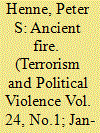

|
|
|
|
|
| Publication |
2012.
|
| Summary/Abstract |
Does religion lead to greater destructiveness from suicide terrorism? And if so, how does it influence this form of political violence? Recent analyses of terrorism point to the significance of religion, but are divided as to whether religion itself matters, or certain types of religious terrorist groups are actually driving suicide terrorist violence. This article draws on social movement theory and recent work in the study of suicide terrorism to argue that religion influences the severity of suicide terrorist attacks as an ideology groups use to justify their struggle and gain public support. This effect occurs regardless of a group's goals or organizational nature. The theory is tested using a generalized estimating equation to account for multiple attacks by several groups. The study finds that the religious ideology of a group greatly increases the number of deaths from a suicide attack, even if varying group motivations and structural factors are taken into account. The article helps to clarify the effect of religion on contemporary terrorism, contributing to the study of both terrorism and religion and politics.
|
|
|
|
|
|
|
|
|
|
|
|
|
|
|
|
| 2 |
ID:
108796
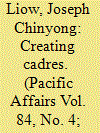

|
|
|
|
|
| Publication |
2011.
|
| Summary/Abstract |
Since the 1999 general elections, when it emerged with the most impressing performance in Malaysian political history, the Pan-Malaysian Islamic Party, or PAS, has elicited significant scholarly attention. This has resulted in the production of a wealth of information about the party's origins and evolution. Yet, while most observers of Malaysian politics note that, next to UMNO, PAS is the most organized and well-resourced political party in the country, there remains a dearth of knowledge about the internal workings of PAS, and specifically, how the party developed, maintained and mobilizes its impressive machinery. This paper aims to unpack the puzzle of the nature of PAS's mobilization by studying the party's youth wing (also known as PAS Youth). Through the conceptual framework of resource mobilization theory and a detailed study of milestone events in the party's recent history, the paper argues that the youth wing has played a pivotal role in defining the party's identity as well as its political triumphs. At the same time, however, its integral role within PAS has meant that the challenges confronting the parent party have undoubtedly rebounded upon them as well.
|
|
|
|
|
|
|
|
|
|
|
|
|
|
|
|
| 3 |
ID:
069624
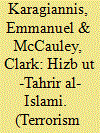

|
|
|
| 4 |
ID:
147713


|
|
|
|
|
| Summary/Abstract |
The rise of the Islamic State (ISIS/ISIL) is not well understood at this point. This paper starts by comparing the Islamic State to the Vietnamese communists in a revolutionary warfare framework and makes a causal argument that the Islamic State’s defeat of the Sahwa (Awakening) movement in Iraq was the key to its successful establishment of control of most Sunni areas and the mobilization of its population for support. Islamic State operational summaries and captured documents are used to quantitatively establish the impact of the subversion campaign against the Sahwa and Iraqi government and trace the efforts of operatives in tribal outreach and recruiting. This research provides a valuable insight into the return of a powerful method of insurgency as well as a glimpse into the vast clandestine network that provides the strength of the Islamic State movement.
|
|
|
|
|
|
|
|
|
|
|
|
|
|
|
|
| 5 |
ID:
172197


|
|
|
|
|
| Summary/Abstract |
After conquering large swaths of Syria and Iraq, the IS undertook an aggressive sectarian campaign in which they not only enacted horrific violence against the Shia people, but also damaged or destroyed several key Shia mosques and shrines. Drawing on Social Movement Theory (SMT), this article analyzes the response by various Shia non-state actors—militia leaders, religious clergymen, populist preachers, and seminal poets. It argues that they used the IS threat to Shia holy sites to develop and deploy a mobilization frame that has come to be referred to as the “shrine protection narrative.” The article also documents the manifold consequences of the shrine protection narrative: it underpinned a mass recruitment drive that saw tens of thousands enlist; it legitimized foreign Shia militias to enter the conflicts in both Syria and Iraq; it justified the formation of entirely new militias who declared the centrality of shrine protection to their mandate; and it mobilized them to enact political violence. In doing so, this article extends existing studies of SMT to demonstrate that “sacred spaces”—and particularly the need to protect religious sites from specific threats—can serve as a powerful mobilization frame towards political violence.
|
|
|
|
|
|
|
|
|
|
|
|
|
|
|
|
| 6 |
ID:
185519
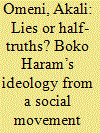

|
|
|
|
|
| Summary/Abstract |
Using Social Movement Theory (SMT) as a methodological framework and explicitly employing the core SMT concepts of political opportunism and framing, this paper seeks to examine Boko Haram's use of discourse in activism. As a rarely employed research method within the Boko Haram literature, SMT holds explanatory power around the movement's approach to transforming motivation potential into actual mobilisation via frame resonance. Focusing on the application of framing within (interpreted) sermons, lectures and exhortations by both Muhammad Yusuf and Abubakar Shekau as former substantive leaders of Boko Haram, this paper unpacks the discourse of Boko Haram's ideology. The paper shows that this ideology, which contrasts the softened core of the Salafist/Wahhabi doctrines from which Boko Haram broke away, relies on problematic interpretations of Qur’ānic exegesis and political thought as both relate to faith and governance in northern Nigeria. One policy recommendation to emerge from this study is that counter-narratives to Boko Haram's ideology should highlight not just why but also how the group's rhetoric employs lies and half-truths in an attempt to rationalise its activism; despite what appears to be an adherence to Qur’ānic exegesis, in making its claims.
|
|
|
|
|
|
|
|
|
|
|
|
|
|
|
|
| 7 |
ID:
178098
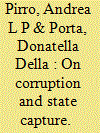

|
|
|
|
|
| Summary/Abstract |
The article draws on social movement theory to understand collective action against corruption in Hungary. While offering a perspective on anti-corruption activism, the article demonstrates its limits against a set of unfavourable factors. Our enquiry reveals that the political context in which anti-corruption activism develops, that is, Hungary under Viktor Orbán, critically affects its mobilising potential. Closed political opportunities prompt anti-corruption activists to adopt outsider strategies; moreover, they shape the contentious content and resonance of their discourses. Overall, our interviews with prominent anti-corruption activists reveal the limited outcomes of collective action in this field.
|
|
|
|
|
|
|
|
|
|
|
|
|
|
|
|
| 8 |
ID:
163199
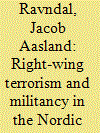

|
|
|
|
|
| Summary/Abstract |
Combining new quantitative and qualitative data, this article first describes and compares the evolution of right-wing terrorism and militancy in the Nordic countries between 1990 and 2015. Having established that Sweden has experienced considerably more right-wing terrorism and militancy than the other Nordic countries have, the article then seeks to account for Sweden’s outlier position. In doing so, the article draws on three concepts proposed by social movement research: organizational resources, political opportunities, and frame analysis. Applying these concepts to the Nordic countries, the study finds that Sweden’s outlier position may result from different WWII experiences, leaving Sweden with a stronger and more resilient extreme right movement, but also from receiving more immigrants while lacking influential anti-immigration (radical right) parties, and from conducting a more restrictive public debate on immigration, leaving little room for anti-immigration concerns in the public sphere. While the first two explanations are consistent with existing research, the third challenges the dominant view on how the public debate on immigration might influence extreme right mobilization and violence.
|
|
|
|
|
|
|
|
|
|
|
|
|
|
|
|
| 9 |
ID:
124606
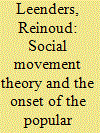

|
|
|
|
|
| Publication |
2013.
|
| Summary/Abstract |
This article takes stock of my attempt to scrutinize the onset of the Syrian uprising with the help of some key analytical concepts derived from social movement theory, including "opportunity" and "threat," "social networks," "repertoires of contention," "framing," and "diffusion." These tools allow me to identify and disentangle the mechanisms of early mobilization and the uprising and explain why they commenced in relatively peripheral areas. Social networks and framing processes are argued to have been key in mobilization, by transmitting opportunities derived from the "Arab Spring," by mediating the nexus between repression and mobilization, by creating and feeding a rich new repertoire of defiant protest acts and claims-making, and by aiding the diffusion or agglomeration of mobilization throughout the country.
|
|
|
|
|
|
|
|
|
|
|
|
|
|
|
|
| 10 |
ID:
162461
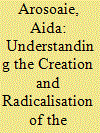

|
|
|
|
|
| Summary/Abstract |
This paper analyses the Students Islamic Movement of India (SIMI) and the Indian Mujahideen (IM) through the lens of social movement theory. By locating these movements in a larger historical and socio-political configuration, the paper documents the national and international political opportunities that fostered SIMI and IM's emergence and radicalisation, including the rise of Hindu extremism, socially institutionalised discrimination and international Islamist revival. Further, the paper investigates the emergence of a seemingly new collective identity and the resources it mobilised. Finally, it investigates the frames employed in justifying calls for violence by deconstructing and contextualising the groups’ Islamic cultural repertoires.
|
|
|
|
|
|
|
|
|
|
|
|
|
|
|
|
| 11 |
ID:
173908
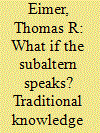

|
|
|
|
|
| Summary/Abstract |
This article explores the success chances of subaltern political agency. Empirically, it investigates how indigenous groups can prevent unwanted access to their traditional knowledge regarding biological resources. The article compares indigenous politics in Brazil and India. Brazilian movements effectively defend regulations to deny the disclosure of their knowledge, whereas comparable demands of the Adivasis in India have remained fairly neglected. To explain these differences, the article connects the insights of social movements and postcolonial theories. It shows that a synopsis of both literatures helps to explain both the potential and the limitations of indigenous political agency.
|
|
|
|
|
|
|
|
|
|
|
|
|
|
|
|
| 12 |
ID:
175491
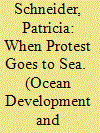

|
|
|
|
|
| Summary/Abstract |
The article applies social movement theory to piracy and terrorism as a common conceptual roof, contextualizing and theorizing these phenomena. The cases of Nigeria and Somalia were chosen because pirate and terrorist groups are or have been active in the maritime domain in both countries, posing a problem for the international shipping community. In addition, these cases are special insofar as pirate and terrorist groups in these countries have used powerful narratives to underpin an attitude of social protest to legitimize their violence. The article critically examines whether the characteristics and modes of social movement theory apply to these cases and outlines the possible benefits and limits. It further includes perspectives from other conceptual frameworks from philosophy, sociology, and psychology. The analysis concludes that the concepts can add to our understanding of the phenomena of maritime violence. It helps us to view these groups not merely as risk factors and addressees of security governance but through the lens of social protest and the mechanisms and dynamics outlined by social movement theory.
|
|
|
|
|
|
|
|
|
|
|
|
|
|
|
|
|
|
|
|
|